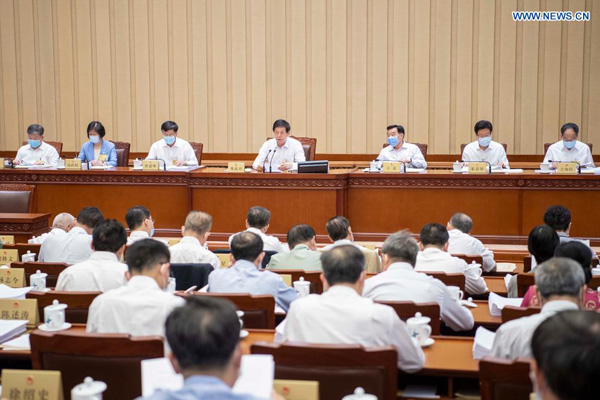Top legislature starts standing committee session

Li Zhanshu, chairman of the National People's Congress (NPC) Standing Committee, presides over the first plenary meeting of the 29th session of the 13th NPC Standing Committee in Beijing, capital of China, June 7, 2021. (Xinhua/Li Tao)
BEIJING -- The Standing Committee of the 13th National People's Congress (NPC), the top legislature, started its 29th session on Monday in Beijing.
Li Zhanshu, chairman of the NPC Standing Committee, presided over the session's first plenary meeting.
Lawmakers reviewed draft laws on data security, the Hainan free trade port, and the protection of status, rights, and interests of military personnel. They also reviewed a draft revision to the Law on Military Facilities Protection, a draft amendment to the Law on Workplace Safety, and draft laws on stamp tax and opposing foreign sanctions.
In reports submitted to the session, the NPC Constitution and Law Committee said that the seven drafts are mature enough and suggested they pass at the session.
The NPC Constitution and Law Committee also submitted to the session draft laws on legal aid and physicians. Both the drafts returned to the legislature for a second reading.
Lawmakers deliberated for the first time a draft revision to the Vocational Education Law, a draft amendment to the Audit Law, and a draft decision to authorize the Shanghai Municipal People's Congress and its standing committee to formulate regulations concerning the Pudong New Area.
The session also deliberated a report on the central government's 2020 final accounts, an audit report on the execution of the central government's 2020 budget and other fiscal revenue and expenditure, and a report on the examination results of the draft 2020 central final accounts.
Other documents reviewed at the session include a report on the development of a modern comprehensive transportation system and a report on the ecological protection of the Yangtze River basin.
Lawmakers were also briefed by Wang Chen, vice chairman of the NPC Standing Committee, on a report on the enforcement of the Law on Traditional Chinese Medicine.
- Top legislature schedules standing committee session for late February
- China's top legislator meets with Uruguayan president
- Senior legislator surveys Anhui on formulating outline of provincial 15th Five-Year Plan
- China's top legislator meets with British PM
- NPC deputies see more engagement with top court



